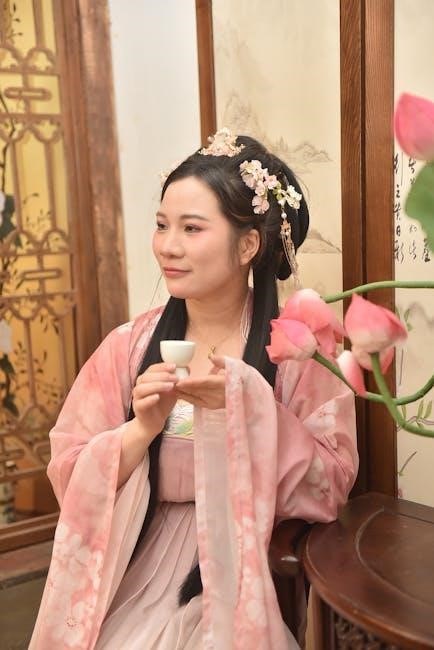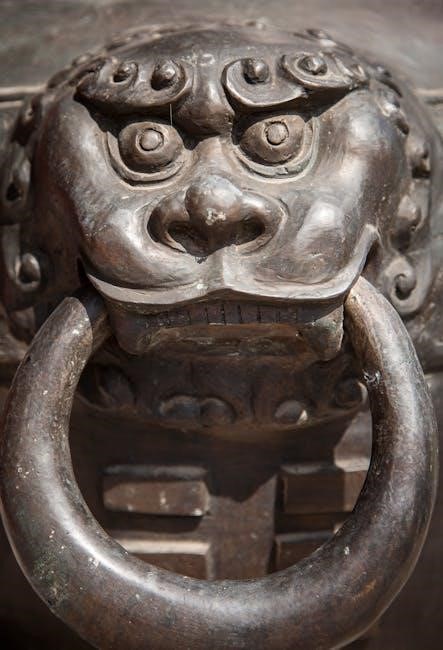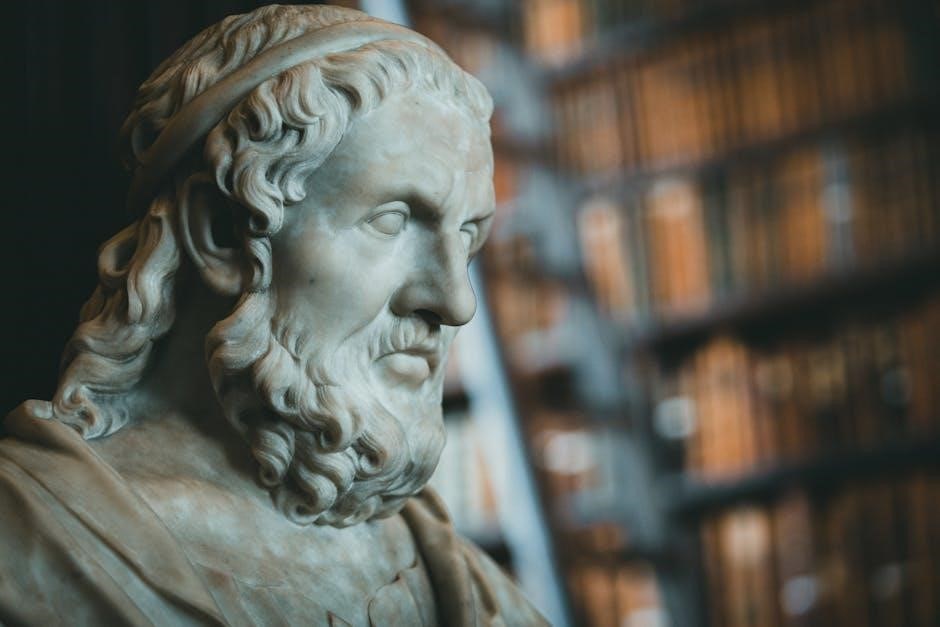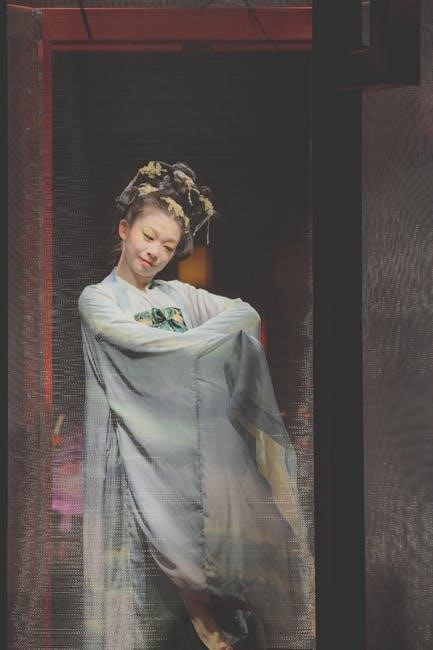Readings in Classical Chinese Philosophy, edited by Philip J. Ivanhoe and Bryan W. Van Norden, offers foundational texts from key thinkers like Confucius, Mencius, and Laozi, providing insights into classical Chinese thought. Available in PDF and e-book formats, it enables comprehensive study of ethical, metaphysical, and political ideas, making it an essential resource for understanding classical Chinese philosophy;
Overview of the Textbook
Readings in Classical Chinese Philosophy, edited by Philip J. Ivanhoe and Bryan W. Van Norden, is a comprehensive anthology that introduces key texts from the classical period of Chinese philosophy. The textbook covers major thinkers such as Confucius, Mencius, Laozi, Zhuangzi, Xunzi, Han Feizi, and Mozi, providing translations and contextual introductions to their works. Each chapter includes a brief overview of the philosopher and their ideas, followed by carefully selected and translated passages. The anthology also features annotated bibliographies for further study. The third edition expands on previous versions, adding new selections, including works by Shen Dao and revised translations of Han Feizi. This structured approach makes it an invaluable resource for students and scholars seeking to explore the richness and diversity of classical Chinese thought.
Importance of Classical Chinese Philosophy
Classical Chinese philosophy holds profound significance as it shaped the intellectual and cultural foundations of East Asia. The teachings of Confucius, Laozi, Mencius, and others address universal themes such as ethics, governance, and human nature, offering timeless wisdom. These ideas have influenced not only ancient China but also contemporary thought, providing insights into morality, social harmony, and personal cultivation. The philosophical traditions of Confucianism, Daoism, Mohism, and Legalism continue to inspire modern debates on ethics, politics, and spirituality. Studying these texts fosters a deeper understanding of cultural and intellectual history, while their practical applications remain relevant in addressing global challenges. As such, classical Chinese philosophy is a vital area of study for anyone seeking to explore the richness of Eastern thought and its enduring legacy.
Structure and Content of the Book
Readings in Classical Chinese Philosophy is organized into chapters, each dedicated to a major thinker or school of thought, such as Confucius, Mencius, Laozi, Zhuangzi, Xunzi, and Han Feizi. Each chapter includes an introduction to the philosopher and their ideas, followed by carefully selected and translated excerpts from their key works. The texts are accompanied by annotations and brief bibliographies, guiding readers to further study. The book covers a wide range of topics, from ethics and morality to political philosophy and metaphysics, providing a comprehensive overview of classical Chinese thought. The third edition includes new selections, such as writings from Shen Dao and expanded translations of Han Feizi, as well as influential texts like the Great Learning and the Mean. This structure ensures accessibility for both newcomers and advanced scholars, making it an invaluable resource for exploring classical Chinese philosophy.
Key Philosophers and Their Contributions
Key philosophers like Confucius, Mencius, Laozi, Zhuangzi, Xunzi, Han Feizi, and Mozi shaped classical Chinese thought through their contributions to ethics, metaphysics, and governance.
Confucius and Confucianism
Confucius, a seminal figure in Chinese philosophy, emphasized ethics, education, and social order. His teachings, compiled in the Analects, advocate for ren (benevolence), yi (righteousness), and li (etiquette), fostering harmony in personal and societal relationships. Confucianism, rooted in these principles, became central to East Asian thought, influencing education, governance, and culture. The philosophy underscores moral development, self-cultivation, and the ideal of the junzi (gentleman). Confucius’s legacy endures, with his ideas remaining relevant in modern discussions of ethics and leadership.
Mencius and the Development of Confucian Thought
Mencius, a prominent Confucian thinker, expanded and refined Confucius’s teachings, emphasizing the innate goodness of human nature. His philosophy, outlined in the Mengzi, introduces the concept of “four sprouts” of morality, advocating for self-cultivation and ethical development. Mencius stressed the importance of education, compassion, and the ruler’s responsibility to ensure the well-being of the people. He critiqued harsh political practices, promoting a humane governance model. His ideas significantly influenced Confucian thought, offering a more optimistic view of human potential and emphasizing the interconnectedness of personal morality and societal harmony. Mencius’s contributions remain central to Confucianism, shaping its ethical and political dimensions.
Laozi and the Foundations of Daoism
Laozi, the legendary founder of Daoism, is best known for authoring the Daodejing, a foundational text of Daoist philosophy. His teachings emphasize harmony with the natural order, or Dao, and advocate for a life of simplicity, non-action (wu-wei), and balance. Laozi’s philosophy critiques excessive human intervention in natural processes, promoting a return to spontaneity and effortless action. Central concepts include the interplay of opposites (yin-yang) and the cyclical nature of reality. The Daodejing also explores ethical and political implications, suggesting that effective governance aligns with the Dao, avoiding coercion and fostering natural order. Laozi’s ideas have profoundly influenced Chinese thought, offering a unique perspective on existence, ethics, and the pursuit of harmony in both personal and societal contexts.
Zhuangzi and the Expansion of Daoist Ideas
Zhuangzi, a key figure in Daoist thought, expanded Daoist ideas through his text, the Zhuangzi, which explores themes of individual freedom, skepticism, and the limits of language. He emphasized the importance of aligning with the natural order (Dao) and embracing spontaneity (wu-wei). Zhuangzi’s philosophy often critiques rigid societal norms and Confucian values, advocating for a more fluid understanding of reality. His ideas include the concept of “equalizing all things,” which challenges fixed distinctions between good and bad, right and wrong. Through parables and anecdotes, Zhuangzi’s text encourages readers to transcend conventional thinking and embrace the transformative power of self-cultivation. His work complements Laozi’s foundations while offering unique perspectives on personal liberation and the nature of existence, making him a central figure in Daoist philosophy.
Xunzi and the Synthesis of Confucian and Daoist Thought

Xunzi, a prominent Confucian thinker, sought to synthesize Confucian and Daoist ideas, offering a unique perspective on ethics, human nature, and governance. He believed that human nature is inherently self-centered but capable of moral cultivation through education and ritual practices. Xunzi integrated Daoist concepts, such as the idea of aligning with the natural order (Dao), into his Confucian framework, emphasizing the importance of social harmony and moral development. His philosophy bridges the gap between Confucian ethics and Daoist spontaneity, advocating for a balanced approach to personal and societal well-being. Xunzi’s ideas, as explored in his text Xunzi, provide a comprehensive understanding of classical Chinese thought, blending the strengths of both traditions to address the complexities of human existence and governance.

Mozi and the Mohist School

Mozi, the founder of the Mohist School, emerged as a critical thinker in early Chinese philosophy, challenging Confucian ideals. He advocated for a utilitarian approach to ethics, emphasizing impartial care and the promotion of social welfare. Mozi critiqued Confucian rituals and hierarchical values, proposing a more egalitarian society. His philosophy centered on the concept of “impartial care,” arguing that universal love and mutual benefit could resolve social conflicts. Mozi also stressed the importance of rational argumentation and the role of heaven (tian) in moral governance. His ideas, as presented in the text Mozi, offer a distinct perspective on ethics, politics, and human nature, making him a pivotal figure in classical Chinese thought. His teachings continue to influence discussions on morality, justice, and societal organization.
Han Feizi and Legalism
Han Feizi, a prominent Legalist philosopher, synthesized Confucian and Daoist ideas to create a pragmatic framework for governance. His philosophy emphasized strict laws, centralized authority, and the ruler’s absolute power. Han Feizi rejected traditional morality and rituals, advocating instead for a system based on rewards and punishments to maintain social order. His ideas, outlined in the text Han Feizi, critiqued Confucian values and proposed a utilitarian approach to statecraft. He believed that human nature was inherently self-interested, necessitating strong legal controls to ensure stability. Han Feizi’s teachings significantly influenced the Qin dynasty’s legalist policies and remain a cornerstone of political philosophy in classical Chinese thought, offering insights into the interplay of power, law, and human behavior.
Major Themes in Classical Chinese Philosophy
Classical Chinese philosophy explores ethics, metaphysics, governance, and epistemology, emphasizing harmony, human nature, and societal order. These themes are central to understanding Confucian, Daoist, and Mohist thought, as explored in the textbook.
Ethics and Moral Philosophy
Classical Chinese philosophy deeply explores ethics and moral philosophy, with Confucianism emphasizing virtues like ren (benevolence) and li (propriety) to foster social harmony. Mencius highlighted innate moral senses, while Xunzi argued for cultivating virtue through education and ritual. Mohism, led by Mozi, advocated for impartial care and utility, challenging Confucian ideals. Daoism, particularly through Laozi and Zhuangzi, emphasized aligning with the natural order (dao) and achieving effortless action (wu-wei). These diverse perspectives collectively shaped a rich ethical framework, influencing personal conduct, societal norms, and governance. The texts in Readings in Classical Chinese Philosophy provide insights into these moral systems, offering timeless wisdom for understanding human behavior and ethical decision-making.
Metaphysics and Cosmology
Classical Chinese philosophy explores metaphysics and cosmology through concepts like qi (vital energy) and the harmony of opposites in yin-yang theory. Daoist texts, such as the Daodejing and Zhuangzi, describe the dao as the ultimate reality, governing the universe through natural patterns. Confucian thought emphasizes the interconnectedness of heaven (tian), earth (di), and humanity, while Mohism explores logical and ontological questions. These ideas provide a holistic understanding of the cosmos, blending philosophical speculation with practical applications. The readings offer insights into how these metaphysical frameworks shape views on existence, change, and the human condition, highlighting the richness of classical Chinese thought in addressing fundamental questions about reality and the universe.
Political Philosophy and Governance
Classical Chinese philosophy deeply explores political thought, emphasizing ethical leadership and societal harmony. Confucianism advocates for rulers to cultivate virtues like ren (benevolence) and yi (righteousness), ensuring moral governance. Mencius further develops this by stressing the importance of the people’s welfare, arguing that rulers must prioritize their subjects’ well-being. In contrast, Legalism, represented by Han Feizi, focuses on strict laws and punishments to maintain order and state power. Daoist thinkers like Laozi propose a minimalist approach, advocating for non-interference (wu-wei) to allow natural social order to emerge. These diverse perspectives provide rich insights into governance, balancing moral ideals with practical strategies for maintaining social stability and prosperity. The readings offer a comprehensive understanding of how classical Chinese thinkers addressed political challenges and envisioned ideal societies.
Epistemology and the Nature of Knowledge
Classical Chinese philosophy explores diverse views on epistemology, focusing on the nature of knowledge and how it is acquired. Confucius emphasizes practical knowledge through self-cultivation and moral practice, while Mencius highlights innate moral knowledge rooted in human nature. Xunzi, however, argues that knowledge is acquired through sensory experience and learning, rejecting innate moral knowledge. Daoist thinkers like Zhuangzi question the limits of knowledge, advocating for intuitive understanding over rational inquiry. These perspectives collectively address how knowledge is attained and its role in guiding human action, offering insights into the interplay between reason, experience, and intuition in understanding the world. The readings provide a nuanced exploration of epistemological debates, revealing the richness of classical Chinese thought on the nature of knowledge and its implications for human life.

Major Texts and Their Significance
Major texts like The Analects, Daodejing, Mengzi, Zhuangzi, Xunzi, and
The Analects of Confucius
The Analects of Confucius is a foundational text in classical Chinese philosophy, compiling the teachings, sayings, and ideas of Confucius. It focuses on ethics, morality, and governance, emphasizing concepts like ren (benevolence), yi (righteousness), and li (etiquette). The text highlights Confucius’s belief in self-cultivation, the importance of education, and the ideal of the junzi (gentleman). Its insights into human nature and societal harmony remain central to Confucian thought. Included in Readings in Classical Chinese Philosophy, the Analects provide a cornerstone for understanding Confucianism and its enduring influence on East Asian culture and philosophy.
The Daodejing (Tao Te Ching)
The Daodejing (Tao Te Ching), attributed to Laozi, is a cornerstone of Daoist philosophy. This concise yet profound text explores the nature of the dao (the Way), emphasizing its role as the ultimate reality and source of all existence. It advocates for wu-wei (non-action), aligning oneself with the natural order rather than forcing change. The text critiques societal norms and hierarchical structures, promoting a return to simplicity and harmony with nature. Philip J. Ivanhoe’s translation, featured in Readings in Classical Chinese Philosophy, highlights the Daodejing’s timeless wisdom. Its 81 chapters blend poetry and philosophy, offering insights into ethics, metaphysics, and the ideal way of living. As a foundational text, it remains central to Daoist thought and continues to inspire global audiences with its universal themes.
The Mengzi (Mencius)
The Mengzi (Mencius) is a foundational text of Confucian philosophy, attributed to Mencius, a prominent disciple of Confucius. It expands on Confucian thought, emphasizing the innate goodness of human nature and the potential for moral cultivation. Mencius introduces the concept of the “four sprouts” of virtue—benevolence (ren), righteousness (yi), propriety (li), and wisdom (zhi)—which are seen as inherent to all humans. The text also explores political philosophy, advocating for compassionate governance and the responsibility of rulers to ensure the well-being of their people. Bryan W. Van Norden’s translation, included in Readings in Classical Chinese Philosophy, provides a clear and accessible interpretation of Mencius’s ideas. The Mengzi remains a central work in understanding Confucian ethics and its relevance to both personal and societal harmony.
The Zhuangzi
The Zhuangzi is a foundational text of Daoist philosophy, attributed to Zhuangzi, a key figure in expanding Daoist thought. It explores themes of metaphysics, epistemology, and political philosophy, emphasizing the harmony of all things and the limitations of human knowledge. The text critiques rigid social norms and advocates for a carefree existence aligned with the natural order, or Tao. Concepts like wu-wei (non-action) and relativism are central, challenging readers to embrace spontaneity and reject artificial distinctions. The Zhuangzi also critiques Confucian and Mohist schools, offering a unique perspective on ethics and governance. Paul Kjellberg’s translation in Readings in Classical Chinese Philosophy provides a nuanced interpretation, making Zhuangzi’s ideas accessible to modern readers. This text remains a cornerstone of Daoist thought, offering insights into living in harmony with the natural world and questioning conventional wisdom.
The Xunzi
The Xunzi is a foundational text of classical Chinese philosophy, attributed to Xunzi, a thinker who synthesized Confucian and Daoist ideas. It emphasizes the importance of social norms, education, and ritual in cultivating virtue, arguing that human nature is inherently self-interested but can be transformed through moral education. Xunzi’s philosophy diverges from Mencius, as he believes humans are not inherently good but can become so through effort and societal structures. The text critiques Daoist ideas of natural spontaneity, advocating instead for a structured, ethical society. Eric L. Hutton’s translation in Readings in Classical Chinese Philosophy highlights Xunzi’s nuanced views on ethics, governance, and human nature, making his ideas accessible to modern readers. The Xunzi remains a vital work for understanding the integration of Confucian and Daoist thought in classical Chinese philosophy.
The Han Feizi
The Han Feizi is a central text of Legalist philosophy, authored by Han Fei, a thinker who emphasized strict governance, law, and state authority. It critiques Confucian and Daoist ideas, advocating for a pragmatic approach to ruling through clear laws, rewards, and punishments. The text argues that human nature is inherently selfish, requiring strong state control to maintain order. Its ideas significantly influenced the Qin dynasty’s legal system. Bryan W. Van Norden’s translation in Readings in Classical Chinese Philosophy provides insights into Han Fei’s views on power, authority, and the role of the ruler. The Han Feizi remains a crucial work for understanding Legalism and its impact on Chinese political thought, offering a distinct perspective on governance and societal order.

Modern Relevance and Applications
Classical Chinese philosophy remains highly relevant in modern times, offering insights into ethics, governance, and personal well-being. Texts like the Daodejing and The Analects are applied in leadership ethics, environmental sustainability, and psychological well-being. Their emphasis on harmony, balance, and moral cultivation resonates with contemporary concerns. Bryan W. Van Norden’s work highlights how these ideas can bridge cultural divides, providing frameworks for cross-cultural understanding. The integration of classical Chinese thought into modern philosophy demonstrates its enduring value, making it a vital resource for addressing global challenges and fostering personal growth in today’s interconnected world.
